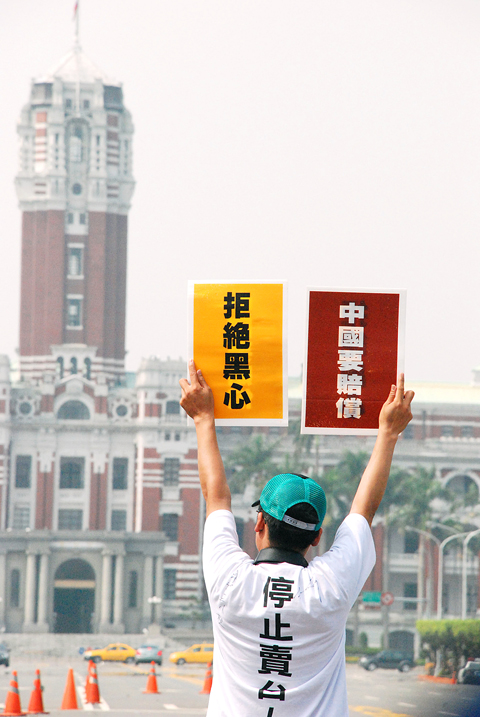The Democratic Progressive Party (DPP) said yesterday it had proposed holding rallies on Nov. 3 and Nov. 4 in Taipei City to protest against the upcoming visit of Chen Yunlin (陳雲林), chairman of China’s Association for Relations Across the Taiwan Strait.
Chen is scheduled to arrive in Taipei next Monday for a second round of cross-strait talks.
The proposed rallies would come hot on the heels of a demonstration on Saturday against Chen’s visit, a perceived lack of government action concerning imports of melamine-tainted milk and the “incompetence” of the government.

PHOTO: CNA
The DPP, which co-hosted Saturday’s rally with the Taiwan Solidarity Union and a number of pro-localization groups, said that more than 600,000 people attended the rally. The DPP said it was a success and that it would use “people power” to express its opposition to Chen’s visit and the government’s China-friendly policies.
“Saturday’s rally was a great success as it clearly expressed the five main appeals: No hollowing out sovereignty, no incompetent governance, no ‘one China’ market, no tainted products and no acceptance of Chinese academic degrees,” DPP caucus whip William Lai (賴清德) said.
The focus of the rally was not affected by former president Chen Shui-bian’s (陳水扁) participation, he said.
The DPP has been put in an awkward position in its relationship with Chen Shui-bian, who was implicated in an alleged money-laundering case.
Some members have suggested the party distance itself from him to stress party integrity and reform, while others worry that doing so would draw ire from its core supporters, most of whom are Chen Shui-bian diehards.
Dozens of people who attended Saturday’s demonstration spent the night on Ketagalan Boulevard — the site of the rally — and continued a sit-in protest yesterday, holding banners and chanting slogans.
Police watched the activity but did not make any attempts to force them to leave as the road permit obtained by the event-organizers allowed the crowd to stay until 10pm last night.
The DPP said the proposed rallies on next Monday and Tuesday would be held in front of Taipei Main Station, but that details were still being discussed.
DPP Chairwoman Tsai Ing-wen (蔡英文) said in a press statement yesterday that “the tremendous rally showed that Taiwanese identity still existed.”
Presidential Office Spokesman Wang Yu-chi (王郁琦) said on Saturday evening that President Ma Ying-jeou (馬英九) would be very happy to talk about combating violence, fighting corruption and other economic issues with Tsai.
Tsai said Ma’s response was an attempt to shift the focus away from people’s resentment of his policies.
“I regret that Ma’s first response was disappointing,” Tsai said. “We have to continue to take to the streets.”
The Chinese Nationalist Party (KMT) caucus said yesterday that the DPP failed to show its opposition to “violence” and “corruption” during Saturday’s rally.
KMT caucus deputy secretary-general Lo Shu-lei (羅淑蕾) told a press conference that cheering for Chen Shui-bian during the event showed that he had won a “victory” over the public’s “anti-corruption” movement.
ADDITIONAL REPORTING BY FLORA WANG

Taiwan is gearing up to celebrate the New Year at events across the country, headlined by the annual countdown and Taipei 101 fireworks display at midnight. Many of the events are to be livesteamed online. See below for lineups and links: Taipei Taipei’s New Year’s Party 2026 is to begin at 7pm and run until 1am, with the theme “Sailing to the Future.” South Korean girl group KARA is headlining the concert at Taipei City Hall Plaza, with additional performances by Amber An (安心亞), Nick Chou (周湯豪), hip-hop trio Nine One One (玖壹壹), Bii (畢書盡), girl group Genblue (幻藍小熊) and more. The festivities are to

Auckland rang in 2026 with a downtown fireworks display launched from New Zealand’s tallest structure, Sky Tower, making it the first major city to greet the new year at a celebration dampened by rain, while crowds in Taipei braved the elements to watch Taipei 101’s display. South Pacific countries are the first to bid farewell to 2025. Clocks struck midnight in Auckland, with a population of 1.7 million, 18 hours before the famous ball was to drop in New York’s Times Square. The five-minute display involved 3,500 fireworks launched from the 240m Sky Tower. Smaller community events were canceled across New Zealand’s

The Ministry of Foreign Affairs (MOFA) yesterday said it is closely monitoring developments in Venezuela, and would continue to cooperate with democratic allies and work together for regional and global security, stability, and prosperity. The remarks came after the US on Saturday launched a series of airstrikes in Venezuela and kidnapped Venezuelan President Nicolas Maduro, who was later flown to New York along with his wife. The pair face US charges related to drug trafficking and alleged cooperation with gangs designated as terrorist organizations. Maduro has denied the allegations. The ministry said that it is closely monitoring the political and economic situation

‘SLICING METHOD’: In the event of a blockade, the China Coast Guard would intercept Taiwanese ships while its navy would seek to deter foreign intervention China’s military drills around Taiwan this week signaled potential strategies to cut the nation off from energy supplies and foreign military assistance, a US think tank report said. The Chinese People’s Liberation Army (PLA) conducted what it called “Justice Mission 2025” exercises from Monday to Tuesday in five maritime zones and airspace around Taiwan, calling them a warning to “Taiwanese independence” forces. In a report released on Wednesday, the Institute for the Study of War said the exercises effectively simulated blocking shipping routes to major port cities, including Kaohsiung, Keelung and Hualien. Taiwan would be highly vulnerable under such a blockade, because it